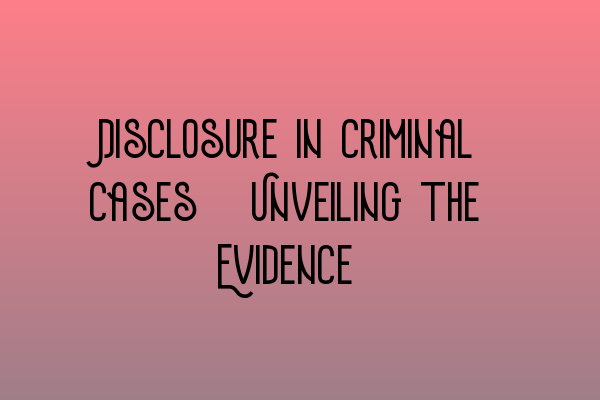Disclosure in Criminal Cases: Unveiling the Evidence
Disclosure is a crucial element in criminal cases, as it involves the process of uncovering and sharing evidence between the prosecution and the defense. It ensures that all parties have access to the necessary information to present their case effectively. In this blog post, we will delve into the importance of disclosure, the guidelines and obligations surrounding it, and its impact on the overall criminal justice system.
The Significance of Disclosure
Disclosure plays a fundamental role in upholding the principles of fairness and transparency in criminal proceedings. It allows the defense to fully analyze and challenge the evidence brought forward by the prosecution, enabling them to mount a robust defense on behalf of their clients. By ensuring all parties have equal access to the evidence, disclosure promotes a level playing field and protects against wrongful convictions.
Moreover, disclosure is not just about sharing evidence; it also encompasses providing any relevant information that may assist the defense in preparing their case. This can range from witness statements and expert reports to CCTV footage and forensic test results. By providing the defense with complete and accurate information, the prosecution upholds their duty to act in the interests of justice.
Guidelines and Obligations
Disclosure in criminal cases is governed by various guidelines and obligations. The Criminal Procedure and Investigations Act 1996 (CPIA) sets out the framework for disclosure in England and Wales. The Act establishes the obligations of both the prosecution and the defense in relation to disclosure.
Prosecutors are duty-bound to disclose material that may undermine the prosecution case or assist the defense. This includes information that may affect the credibility of a witness or cast doubt on the reliability of the evidence. Additionally, the prosecution is required to disclose material that may assist the defense in investigating the case or making representations to the court.
On the other hand, the defense has an obligation to actively seek disclosure from the prosecution. This can be achieved through various mechanisms, such as making specific requests, filing applications, or participating in case management hearings. The defense is responsible for identifying the material they require and ensuring it is disclosed to them in a timely manner.
The Impact on Criminal Justice
The proper disclosure of evidence is crucial for maintaining the integrity of the criminal justice system. Failing to disclose material or providing incomplete information can have severe consequences, including miscarriages of justice and the erosion of trust in the legal process.
By adhering to disclosure obligations, the prosecution minimizes the risk of wrongful convictions and ensures that only the guilty are held accountable for their actions. Similarly, the defense is empowered to adequately prepare and present their case, allowing for a fair and balanced trial.
Moreover, the effectiveness of the disclosure process relies heavily on technology and digital advancements. Modern methods of communication and information storage have transformed the way evidence is managed and shared. Utilizing secure platforms and encrypted systems ensures the confidentiality and integrity of sensitive materials.
Conclusion
Disclosure is an integral aspect of criminal cases, ensuring that all parties have access to the necessary evidence and information. It promotes fairness, transparency, and the principles of justice. The adherence to disclosure guidelines and obligations is crucial for maintaining the integrity of the criminal justice system and upholding the rights of defendants.
For related articles and resources, please check out:
